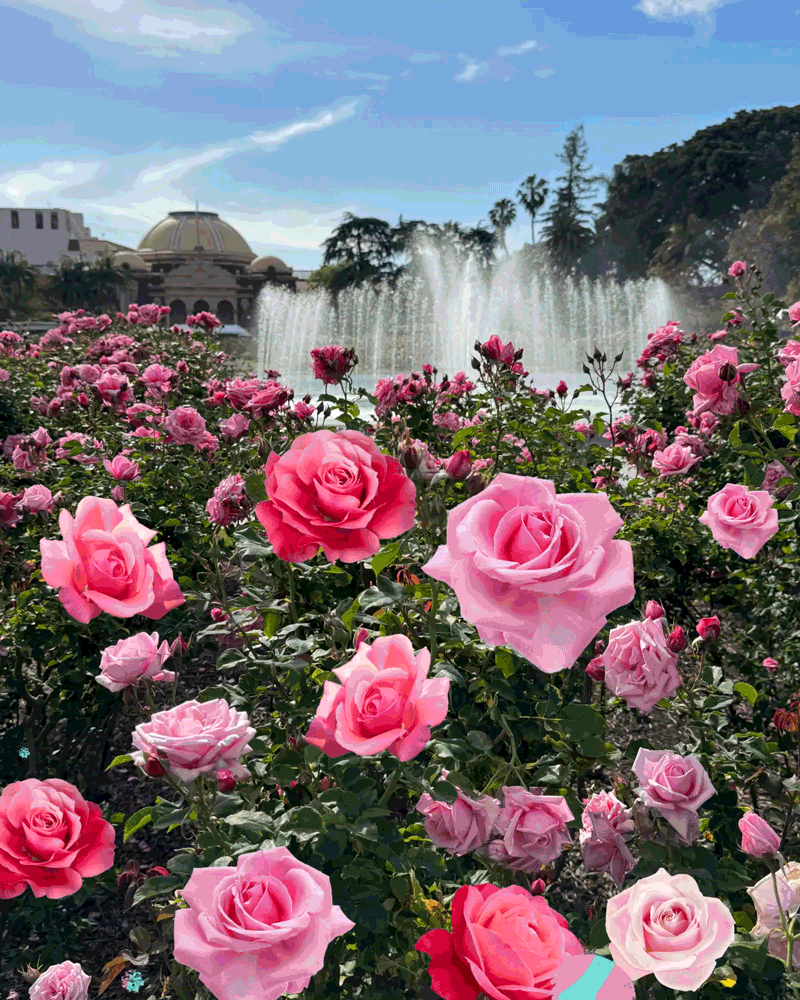
7 stunning L.A. gardens where you can stop and smell the roses (quite literally!)
Spring doesn’t always arrive with a bang in L.A. Temperatures tiptoe up and the sun waits a little longer to set, but there isn’t exactly a flashing sign to tell us that we’re in the vernal glow of a new season.
That is, unless you happen to glimpse a rose garden. May is to roses what July is to fireworks, which is to say, it’s when they go off. Glum, pruned-back bushes erupt with stupid-pretty blossoms that evoke pastel supernovas, origami whirlpools and tiny watercolor ballgowns.
Planning your weekend?
Stay up to date on the best things to do, see and eat in L.A.
And they aren’t just easy on the eye. According to Karen Haney, who teaches horticultural therapy at UCLA Extension, rose blossoms can be a balm for the mind too.
“Roses give us a wide range of sensory experience that we can use to improve our mood,” she told me, noting that the kaleidoscopic colors and textures can actually engage our brains to reduce anxiety.
Then there are the fragrances — those mysterious swirls of floral, herbal and animal notes that have intoxicated poets and perfumers for millennia. “When you are experiencing that scent, the mindfulness that you’re giving to that moment is providing a restorative experience for your brain, a little bit of softness,” Haney said. “Our heart rate might lower, we take deeper breaths and we’re calming our sympathetic nervous system.”
Luckily for Angelenos, these natural mood-boosters are easy to find. Abundant sunshine and mild weather make Southern California an ideal climate for rose gardens, from charming historic plots like the Orcutt Ranch Horticultural Center to world-class collections like the Huntington Library, Art Museum and Botanical Gardens and the Exposition Park Rose Garden.
The blooms stay spectacular from spring all the way through the beginning of winter, when most gardeners prune their blossoms to help the plants recharge for the next year. But there’s no time like the present, so we’ve put together a useful map to help you discover the most show-stopping, fragrant and relaxing rose gardens in the L.A. area right now.
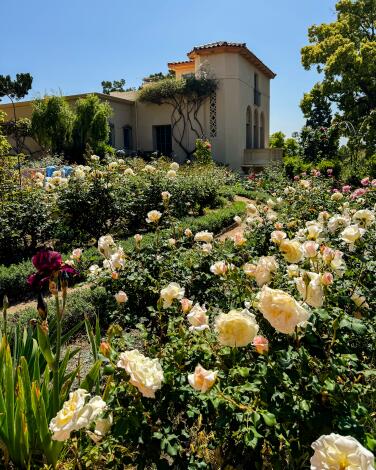
Virginia Robinson Gardens rose gardens
The display garden, just across from a tennis court where Hollywood stars like Charlie Chaplin used to play, is still maintained according to Virginia’s original design, with an emphasis on her favorite color. See if you can guess what it was as you browse the 34 different rose varieties, including blushing Mon Cheris, pastel Sweet Surrenders and Virginia’s personal preference, a Barbie-bright hybrid tea rose called Eiffel Tower.
High up on the house’s outer wall, you can even spot a historic climbing rose that was planted during Virginia’s lifetime and still explodes in yellow and white blooms every year. On the other side of the tennis court (which has a few more historic rose plants clinging to its borders), the sloped cutting garden spills down a hillside of blossoms. “Virginia loved to entertain and would decorate with roses that matched the color of her dress that day,” Diane Sipos, superintendent of the park, told me on a recent visit. Like I said: opulence.
In 1977 the estate was handed over to L.A. County, which now runs reservation-only tours along with a number of on-site classes and programs. (Events are posted about a month out and tend to fill up quickly, so it helps to check the official website regularly for new dates.) If you want especially Instagrammable lighting, try a Golden Hour tour, which showcases the gardens at sunset. Wellness classes — including sound baths and meditative walks — offer a chance for even more mindfulness on the grounds. And for a hands-on experience with the roses themselves, look out for the annual pruning class in January, when master gardeners give lessons in the cutting garden.
Hours: By reservation only.
Admission: Adults $15, children (5-12) $6, students $11, seniors (62+) $11.
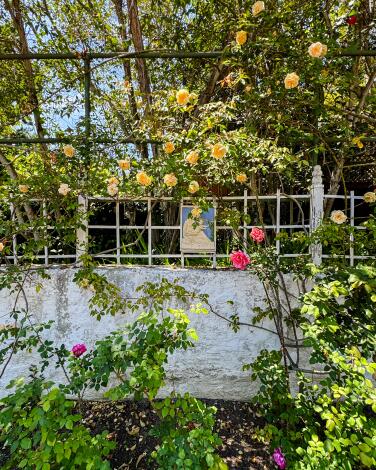
Rancho Los Alamitos rose garden
Bixby, then owner of Rancho Los Alamitos, kept that aroma close at hand by commissioning a small but stately rose garden on her estate in 1927. The historic Rancho’s 4 acres include sprawling gardens for cacti and native plants, complete with tiny waterfalls, but the roses have an especially tranquil position on a tiled terrace between the Olive Patio and the Oleander Walk. (Fun garden gossip: Those aren’t actually oleanders anymore; they’re crepe myrtles.)
Designed by the Olmsted brothers, sons of landscaping legend Frederick Law Olmsted, the rose garden holds a few dozen plants, including some tea roses that were introduced before 1910. Don’t miss the Los Angeles rose, which became the first Southern Californian rose to win the coveted Bagatelle prize in Paris in 1918, or the fiery pink-and-yellow Talisman that crawls up one of the garden posts. (It’s so rare that the Rancho staff are currently searching far and wide for another example to climb the matching post on the other side of the path.)
If you’re coming here for the first time, don’t be intimidated when you pull up to the security barrier for the gated Bixby Hill community on Palo Verde Avenue, across from the CSU Long Beach campus. Just tell the guard you’re going to the Rancho, and they’ll happily hand you a parking permit during public visiting hours.
Public hours: 1 to 5 p.m. Wednesday-Sunday
Admission: Free
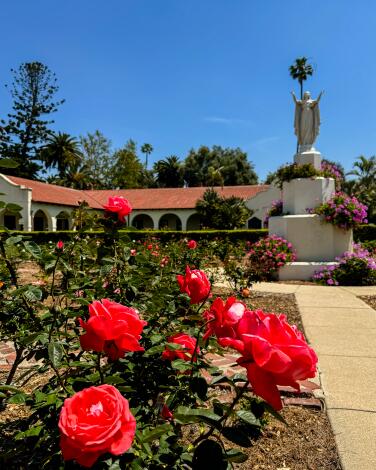
Dominguez Rancho Adobe Museum rose garden
The estate’s rose garden — laid out in tidy plots interlaced with red-brick footpaths — was commissioned in the 1940s as a Works Progress Administration project. Manual labor came from the seminarians who lived in the ornate building opposite the adobe, which is now a retirement home. (The statue of Mary in the garden still faces the seminary with outstretched arms, as a permanent thank-you for the flowers.)
“In terms of size, we’re actually bigger than the White House Rose Garden,” boasted Mike Horibe, the garden’s rose curator, who has been revitalizing and replanting the space for the last seven years with support from the foundation and local volunteers. His work has paid off in more than 300 blooming rose varieties, ranging from historic bushes to modern ones such as the eye-catching Ketchup & Mustard rose (red and yellow, naturally) and the fragrant yellow George Burns, which thankfully smells nothing like cigars.
Admission and parking are always free, but check the museum’s website for hours and reservations. For the most tranquil visit, aim for a 1 p.m. slot — that’s when the school trips usually take their lunch break. You can even request Horibe personally as a guide for a special 45-minute tour focused on the gardens or attend one of his rose pruning workshops every January.
Hours: Tours available Wednesday, Saturday and Sunday at 1, 2 and 3 p.m. (Reservations required for Sunday tours only.)
Admission: Free.
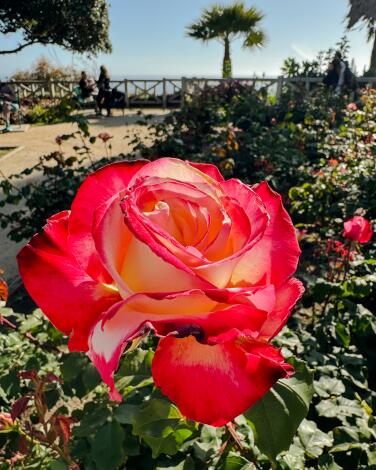
Palisades Park Rose Garden
Set on a bluff about 100 feet above the Pacific, the garden offers a rare sweet-and-salty sensory experience of rose fragrance and ocean air, which becomes a little more magical every hour as the sun slides down to the horizon. (The sea spray actually isn’t great for roses, but Santa Monica’s gardeners monitor the soil closely for salinity.) There are 100 or so roses here, including the white-and-pink floribunda Queen Elizabeth, which originated in Southern California, the bright red Knockout and a special Olympiad Rose Bush with a plaque that commemorates the 1984 Los Angeles Games and marathon.
The flowers are organized in neat plots around a bronze statue of Arcadia Bandini Stearns de Baker, the Mexican American widow of Santa Monica co-founder Col. Robert Baker. The rose garden wouldn’t be here without her; Arcadia donated the land that is now Palisades Park, along with part of Rustic Canyon and the property that now holds the West L.A. VA Medical Center in Westwood, among others.
The garden also has one more rare distinction that you can’t see: It’s part of Santa Monica’s water self-sufficiency plan and is on track to use 100% recycled water within the next few years.
Hours: 5 a.m.-midnight daily.
Admission: Free.
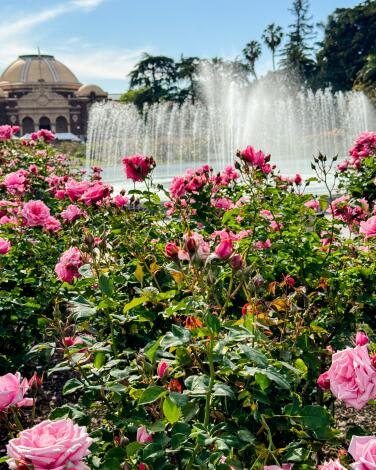
Exposition Park Rose Garden
Here you’ll find towering pink-and-white Unforgettables that stand over 6 feet tall, Rock & Roll blooms that look like tiny action paintings with streaks of red and white pigment, swirling baby-pink Falling in Loves, creamsicle-orange Brass Band blossoms, delicate milky-white French Lace petals and so many more.
If you’re looking for a rose garden to visit with kids, Exposition Park is a perfect choice — its wide, grassy paths offer plenty of space for wandering, four gazebos are available for shady breaks and a large central fountain sends a refreshing mist into the air to keep you cool on hot days.
This park wasn’t always so kid-friendly, though. When it was first built in the late 19th century, it was known as “Agriculture Park” and served as a “kind of perpetual State Fair of the Wild West” filled with “speed freaks, bookies, prostitutes and jockeys,” according to PBS. Today, the wildest crowds you’ll likely run across are tourists snapping photos and influencers banking content in front of rosy backdrops.
Parking in the nearby Expo Park lots will cost you $15, but the garden itself is free and only steps from the Expo Park/USC stop on the Metro E Line. Just don’t plan a visit between Jan. 1 and March 15, when the park is closed for annual maintenance.
Hours: Daily from 9 a.m.-sunset. Closed Jan. 1-March 15.
Admission: Free.
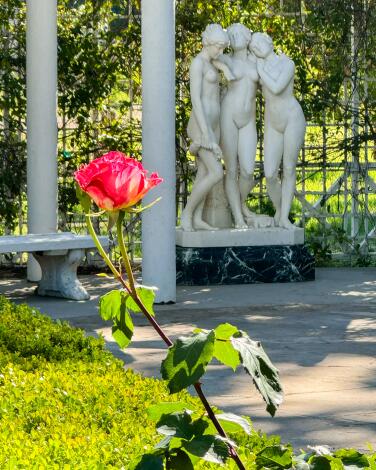
Orcutt Ranch Horticultural Center & Community Garden rose garden
But for pyrotechnic beauty, nothing beats the rose garden, bursting with red and orange blooms. More than 400 rose bushes — some about 100 years old — grow here, including trees and climbing varieties. The most historic are the ones on the east side of the adobe house — a patch of fragrant, strawberries-and-cream-colored Double Delights that were planted by Mary herself, who wanted to be able to see them from the nearby window of her office. Mary was one of the original members of the West Valley Garden Club, whose volunteers still work in the gardens today. “I think of this place as a hidden gem,” Yvonne Jones, a Garden Club member, told me on a recent visit. “It’s so quiet and serene. I come here almost every day, just to walk.”
Orcutt Ranch isn’t off the radar when it comes to weddings, though. In the summer, there’s an event almost every Friday, Saturday and Sunday evening. For a more peaceful visit, come in the morning or during the week. You never need a reservation, and admission is free. Dogs are welcome, but be sure to keep them on leash since coyote sightings are possible.
Hours: Open daily, dawn to dusk.
Admission: Free.
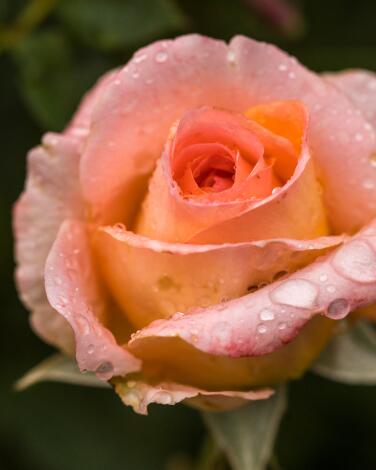
The Huntington Library, Art Museum, and Botanical Gardens
The sprawling collection of extraordinary roses — more than 1,300 cultivars — makes up just one part of the Huntington’s 130 acres of gardens. The museum’s Instagram account even boasted recently that its roses have “reached peak bloom.” In the rose garden, you’ll find labels with information about the many blooms, including Huntington’s 100th, a yellow and pink Floribunda hybrid so named in honor of the museum’s centennial in 2019. If you visit on Thursdays, you can hear performances by the Pasadena Conservatory of Music from 1 to 3 p.m. through June 10. The Rose Garden Tea Room reopened in 2023, but best to get reservations in advance.
In addition to the 3-acre rose garden, the Huntington boasts authentic Chinese and Japanese gardens and areas dedicated to Australian plants, Shakespearean plants, herbs, desert plants, jungle and subtropical plants (you can almost hear Tarzan bellowing somewhere in those towering, vine-dripping trees) and, of course, a whimsical garden to enchant children.
Hours: Open from 10 a.m. to 5 p.m. daily except Tuesdays. Reservations required Friday–Sunday. Closed July 4, Thanksgiving, Dec. 24-25 and Jan. 1.
Admission: Prices start at $25 weekdays and $29 on weekends; slightly lower fees for seniors, students and children. Members and children under 4 enter free.
No pets permitted except trained service dogs.
Sign up for The Wild
We’ll help you find the best places to hike, bike and run, as well as the perfect silent spots for meditation and yoga.
You may occasionally receive promotional content from the Los Angeles Times.







